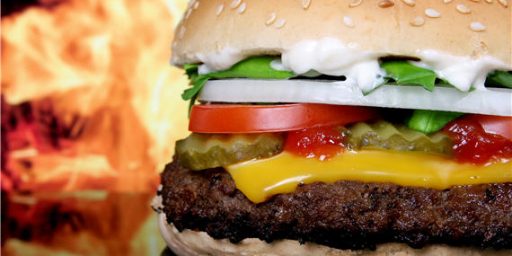Why Is the Developed World Fat?
Lower food prices means we eat more, and thus, we become fatter given our level of activity.
In Why is the Developed World Obese? (NBER Working Paper No. 12954), authors Sara Bleich, David Cutler, Christopher Murray, and Alyce Adams show that rising obesity in the developed world is primarily the result of consuming more calories. Specifically, they find that increased caloric intake accounted for 93 percent of the change in adult obesity from1990 to 2001 (the remainder is attributable to reduced energy expenditure). The increase in caloric intake appears to be driven by technological innovations, such as lower food prices and the ease with which businesses can enter the marketplace, as well as changing sociodemographic characteristics such as increased labor force participation and increased urbanization.
Gee, the cost goes down and consumption goes up. What a shocking conclusion.






When I go to France, the only fat people I see are Americans…
When I go to large gatherings of liberals, the only fat people I see are….LIBERALS!
anjin, why dont you go to that liberal mecca, North Korea? There are no fat people there. Liberals have solved the problem!
Good point anjin-san.
There are many wealthy cultures that do not have the levels of obesity that we do. There is more at work here than a simple inverse correlation between food prices and consumption.
The point of the study seemed to be to parse out the factors of caloric intake and energy expenditure to see what their relative importance is amongst the obese. Only peripherally were they interested in what factors are associated with increased intake. Of course it is not surprising that lower prices associated with that.
How cheap is food in France comparatively? Especially the higher fat/sugar junk foods.
Not to mention-the US is a car culture-we drive everywhere, even if it is just a block or two away. A lot of other nations aren’t.
I’m surprised and a little skeptical of the ratio they find between increased calorie intake and reduced activity. I would have thought that it would have been closer to 60-40.
Obesity is a growing problem in Europe as well as the US. It simply hasn’t caught up yet. There is plenty of cheap fatty and quite tasty food everywhere in Europe I have been. The portions are generally a bit smaller, particularly the soft drinks (but thankfully not the beer) and the activity level is generally higher (more walking and biking, less driving even in places not so flat as here). Another availability difference between the US and EU I have noticed is that there are almost no breakfast restaurants. You can pick up a sweet or savory pastry but not a whole lot else.
Given my druthers, I’ll take being a fat American driving a car over being a skinny Frenchman waiting on a train that’s not coming until the latest strike is over,
I think there are many, many factors – it is correct that obesity rates are rising quickly in Europe and even in places like Japan – high calorie, fast food that is cheap combined with a video game/tv centric lifestyle seems to be the main culprit. What’s the fix? That is a tough one – my suggestion is parenting – my parents regulated what I ate and taught me what is good to eat and what is bad to eat and moderation combined with exercise. Of course leaving this problem to parents nowadays is scary – just look at education.
Living in El Paso (not a place I have ever been before nor want to return to) obesity seems to be the norm likely due to the very heavy diet and complete lack of exercise.
It’s undoubtedly a combination of nature and nurture. As you travel around the United States you find that there are different patterns of body types and different prevailing ethnic types and behaviors in different parts of the country. It’s rather obvious that there would be similar differences between the United States and individual European countries, too.
Since the largest numbers of ethnic roots among whites in the United States are English and German, it seems to me that the most appropriate comparison would be between England and the United States and Germany and the United States. IIRC both England and Germany have their own obesity epidemics.
Here in Chicago, for example, the prevailing ethnic type among whites tends to be Eastern European. I think I need only point out with gentle chiding that the stereotypes for middle aged Polish people tends not to be slender.
Also, it’s good business for restaurants in the U. S. to serve portions that are too large. The food itself is the least expensive part of their business and large portions convey a message of value for money (without actually giving value for money, of course).
BTW, it’s not just developed countries. The Chinese have an obesity problem, too.
Yep, it’s America’s fault. Who do we think we are, making food cheap, tasty and readily available? Then, by god, we eat that very same food. What is wrong with us? I blame the food channel, a whole channel devoted to food, come on, that is just wrong.
I tell you Americans like the easy life and they will invent, innovate and engineer their way to that life regardless of how bourgeoisie it may be. We have no shame and have the cheap, tasty, readily available food to prove it. And if we get fat along the way, it’s a price will have to pay.
You reallys should travel outside of Pig’s Knuckle sometime. Public tranportation in France is fantastic.
Not so much in the Netherlands, though, right? At least in Amsterdam — which is admittedly touristy — there are plenty of places to get pannenkoeken and other hearty breakfast fare.
I love and will miss the pannenkoeken when we leave. I can convince my wife to make them on occasion, but less often than I would like. Where I am the pannenkoeken houses don’t open until lunch and the ones I’ve been to in Amsterdam don’t open until lunch either. There are some places in Amsterdam that you can get American or British style breakfast, but they are not at all common outside the very touristy areas.
Why is the Developed World Obese
I guess Tano and Anjin-san missed the part about the developed world. In other words, it isn’t just America that is getting fat. I’d suggest you guys work on that reading comprehension. It is clearly a cross country study. Sheesh.
I guess Steve is far more excited by the prospect of injecting one of his put-downs than by the tedious drill of actually thinking about what he reads. Is this your best strategy for making yourself appear smart, Steve?
Yes, the article is about the developing world. Anjin made a comment about differences between two parts of that segment of the world. This is what people do sometimes, they take a concept and parse it out a bit. In this case, if you didn’t notice, the difference pointed out served to undermine the rather lame snarky point that you made in your post.
France and the US have relatively similar food prices. In fact, some basics, like bread, are cheaper in France. So this example shows that there is not any necessary correlation between food prices and consumption levels, or of obesity. (Obesity levels in France are about half those in the US).
Its the old causation thing, ya see. Levels of obesity, or increased consumption, associate with lower prices. But, contrary to your snark, lower prices do not necessarily lead to increased consumption (France). Oh its oh so complicated.
I can see why you prefer to stick to one-liners.
Sheesh.
I found food-portions in the US were really really big. That doesn’t help. I also found that it was hard getting nice fresh healty food at decent prices – visits to the States usually ment gaining weight. Though I’ve only been to the eastcoast and Florida, things might be different elsewhere; NY was better than Washington the times I visited there.
Doing more by car doesn’t help either; I’ve stayed in places where you couldn’t go to the supermarket 250 m from the hotel unless you either usd a car or risked your life. But obesity figures in Europe go up too – probabely also due to all these factors.
Oh, and pannekoeken are never eaten for breakfast. They’re not like the American pancakes (fortunately, I like those much more than I should) and are eaten as lunch or as dinner.
In my (limited) experience Europe has more of a cooking and eating at home culture, where fast food is reserved for a day in the weekend. Almost anybody I know cooks at least 5-6 days a week on average whilst Americans are more inclined to go for tv-dinners of fastfood. But that observation might be very wrong ’cause I haven’t been much in American homes and I haven’t really compared notes on it much online.